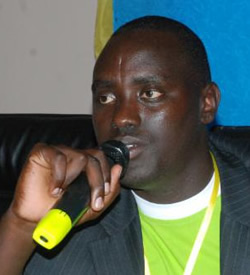

Follow these links to find out more about the Health Policy Project's related work.
- Learn about HPP's work on Health Equity
- Read HPP's post on Universal Health Care
Organization: Umbrella of Organizations of Persons with Disabilities in the Fight Against HIV and AIDS and in Health Promotion
Country: Rwanda
Area of Response to HIV: HIV and Disabilities
Interview was originally published in the April 2015 newsletter.
Interview with Francois Xavier
Francois Xavier Karangwa is the executive director of UPHLS, a nongovernmental organization involved in health promotion and advocacy for persons with disabilities fighting against HIV and AIDS. UPHLS was founded on September 21, 2006, and is composed of eight major disabled persons' organizations (DPOs), ranging from organizations serving veterans of the Rwandan genocide to those that serve children with disabilities or survivors of psychological trauma. The HIV Policy and Advocacy Monitor spoke to Francois about his work and the needs of persons living with disabilities in Rwanda.
HIV Policy and Advocacy Monitor: Tell us about your organization's mission and its focus on HIV policy and advocacy work.
UPHLS' vision is to achieve an HIV-free society, as well as full societal inclusion for persons with disabilities (PWDs). We advocate for the rights of PWDs, particularly regarding their access to health, and we provide HIV prevention programs. Generally, UPHLS supports disabled persons' organizations (DPOs) through capacity-building efforts, monitoring and evaluation of HIV-related activities, and providing health promotion activities for PWDs.
Before establishing this kind of organization, you must understand the area in which you will operate. When UPHLS was founded in 2006, HIV represented a very big problem in Rwanda. We sought to address the issue by collaborating with DPOs and the Ministry of Health to determine how persons with disabilities could be included in the HIV response. The idea was that UPHLS would advocate for PWDs and respond to the challenges they faced in accessing HIV services, including communication barriers and poor socioeconomic situations.
HIV Policy and Advocacy Monitor: What factors have motivated you and led to your involvement in policy and advocacy with UPHLS?
First, I have a physical disability. For me, working with UPHLS was a good opportunity to advocate for my rights to healthcare and become more involved in policy and advocacy work for PWDs.
Second, when you examine the historical treatment of persons with disabilities in Rwanda, we have come a long way. Before independence in 1961, our culture allowed for children with disabilities to be thrown out or hidden. It wasn't until after the genocide in 1994 that advocacy for the rights of PWDs gained traction. Today, every Rwandan knows that PWDs have a right to live with dignity and respect; international conventions, such as the UN Convention on the Rights of Persons with Disabilities, further affirm this.
Third, my legal background and master's degree in public health provide me with a unique perspective in PWD advocacy—specifically, the intersection of the law and public health issues.
HIV Policy and Advocacy Monitor: Why is advocacy important in the response to HIV?
Now that donors and the Ministry of Health are working more with civil society and community-based organizations, UPHLS has the opportunity to present its messages to a broader range of stakeholders and technical working groups to ensure that PWDs are included in the HIV response. Our key achievements include the adaptation of HIV tools (including information on family planning, gender-based violence, prevention of mother-to-child transmission, and opportunistic infections) to address communication barriers often faced by PWDs. These tools have been disseminated to our beneficiaries countrywide. We have also worked with six neighboring countries (Uganda, Kenya, Tanzania, South Sudan, Ethiopia, and Rwanda) and have called for advocacy activities at the Eastern African Disabilities Organization to mainstream PWDs within society and the health system.
HIV Policy and Advocacy Monitor: What are the main policy priorities in Rwanda for you and your organization?
The first priority would be to ensure that health polices acknowledge the challenges faced by persons with disabilities when accessing services. We have a law mandating medical insurance, but provisions to help PWDs access insurance and receive necessary medical care would make it more disability-friendly.
For me, the second priority is related to education policies—especially for children with disabilities. If these children are able to go to school and develop technical skills, carefully designed educational policies can make a positive impact on their professional development and economic security.
The third priority is to address gender-based violence and rape. Policies and social movements related to these issues can too often ignore people with mental impairment or disabilities, placing them at greater risk for acquiring HIV.
Finally, and perhaps most importantly for me, is the issue of job equality. Rwanda has policies that require employers to hire PWDs and women to fill select quotas. The government must work with the private sector to increase employment opportunities for PWDs—for example, by providing tax breaks as an incentive to hire employees with disabilities—thereby improving their likelihood for economic security.